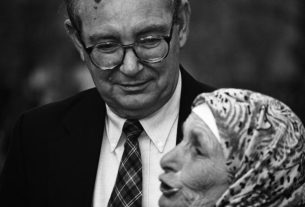What if the biggest untapped resource in European agriculture is not technology or funding – but the women already working in the sector?
At 34, Albertine Ekkels from the Netherlands found herself torn between daily life on a dairy farm and her dream of starting a business.
“The biggest challenge for me was time,” she recalled. “For years, I had ideas, but I couldn’t take the plunge while working full time with my parents on their organic farm.”
That changed in 2023, when Ekkels joined a GRASS CEILING Living Lab – an EU-funded initiative that connects female entrepreneurs in farming, forestry and rural communities with academics and experts in rural innovation.
These “labs”, which run from 2023 to 2026, act as testbeds where women can develop ideas, build networks and trial solutions in real-world settings.
The name is a play on the corporate world’s term “glass ceiling” for the invisible barrier that keeps women from rising to positions of influence.
Inspiring women-led rural innovation
With Living Labs set up in nine European countries (Croatia, Ireland, Italy, Lithuania, the Netherlands, Norway, Spain, Sweden, the UK), the GRASS Ceiling team is providing an important boost to women-led innovation in a wide range of agricultural and rural settings and socio-cultural contexts.
“
The Living Labs show what women can do despite the obstacles. They also show how much more they could do if they were properly supported.
In the Dutch lab, Ekkels met like-minded women keen to push the sector forward. Feeling inspired and supported, she gained the confidence to launch her long-held dream – a booking platform for people wanting to rent farm spaces for events or stays.
Her aim is to attract more people to the countryside and highlight the positive aspects of farm life.
“I want to spread a positive message about farming,” she said. “I want people to be able to visit farms so that they can form their own impressions of farm life.”
The idea is already attracting attention. Ekkels has been nominated one of the three Young Agricultural Talents (Jong Agrarisch Talent) for 2025, a Dutch award that highlights promising entrepreneurs in agriculture.
A hidden force of rural Europe
Ekkels’ story reflects a broader reality. Women make up nearly half of the EU’s rural population, but own only about a third of farms – most of them small. Their work is essential, from managing livestock to driving sustainable tourism, yet often undervalued and underrepresented in policy.
This has consequences. Women face barriers to credit and funding, are rarely recognised by advisory services, and still contend with cultural norms that see farming as a male profession.
Inheritance practices in many regions also favour sons, leaving daughters without land and rendering much of women’s work invisible. The result is a persistent “grass ceiling” that limits women’s influence in shaping the rural economy.
“Women have always been central to rural life, but policies, data and support systems have too often ignored their roles,” said Professor Sally Shortall, president of the International Rural Sociology Association and a leading researcher on gender in agriculture.
Her work has long highlighted gender inequalities in farming, from land inheritance rules that disadvantage women to limited access to capital and training.
Based at the University of Newcastle in the UK, Shortall also works with the South East Technological University in her native Ireland – an EU Gender Equality Champion – where she coordinates their GRASS CEILING work.
“We want to create the conditions for women to lead socio-ecological transitions, from sustainable farming to digital forestry,” she said.
Living labs of change
Beyond individual stories, the GRASS CEILING Living Labs are proving to be powerful catalysts. They bring together farmers, foresters, entrepreneurs, researchers and policymakers in collaborative spaces where women can test ideas, gain visibility and build supportive networks.
In Ireland, sisters Karen and Natalie Keane turned a small kitchen idea into Bean and Goose Chocolate, a thriving brand that now employs a dozen people in County Wexford. In Spain, Silvia González uses drones to monitor forest growth, while Amada de Salas has expanded her agro-tourism business.
“Before, I felt isolated,” said de Salas. “Now I’m part of a network of women entrepreneurs who share knowledge and dare to open doors.”
“The Living Labs show what women can do despite the obstacles,” said Shortall. “They also show how much more they could do if they were properly supported.”
From stories to policy
The GRASS CEILING team is also ensuring women’s voices reach the policy level. Despite decades of efforts to reach gender equality, many national strategies still overlook women’s realities.
One striking example comes from Norway. A 1974 reform gave the eldest child, not just the eldest son, the right to inherit family farms. Yet, women remain underrepresented as landowners.
“It shows that cultural norms can be stronger than legal frameworks,” said Shortall.
“
We’re creating tools to propose the inclusion of more gender-sensitive data into the EU’s Rural Observatory, so that future policies can better reflect the real lives of rural women.
Blanca Casares Guillén, a policy expert at the European Association for Innovation in Local Development and leader of GRASS CEILING’s policy work, points to another gap – data.
“Most monitoring systems still don’t separate data by gender,” she said. “That means women’s work and challenges often go unnoticed. We’re creating tools to propose the inclusion of more gender-sensitive data into the EU’s Rural Observatory, so that future policies can better reflect the real lives of rural women.”
The GRASS CEILING policy roadmap calls for binding commitments on gender equality in EU funding, gender-responsive finance, better childcare in rural areas, and greater representation of women in decision-making.
It includes many practical recommendations and tools to make rural policies more inclusive.
“Now it’s the EU’s turn to embed gender equality into the policies that shape rural life,” said Shortall.
Looking ahead
The women in the GRASS CEILING Living Labs have explored different scenarios for the future of rural Europe. Their visions for the future range from thriving “rural renaissance” communities supported by public investment to depopulated regions struggling with an ageing population and scarce services.
Across all the imagined futures, the challenge of social and cultural expectations looms large. Women repeatedly highlight the double burden of balancing childcare and innovation. Yet they also point to digitalisation and community networks as powerful enablers – precisely the areas that the GRASS CEILING team is working to strengthen.
Breaking barriers, shaping futures
For Ekkels, the Living Lab experience has already been transformative.
“It can be daunting for women to step forward and claim their place. Often, they’re working behind the scenes and don’t recognise their own strength. I want to show that if you have an idea, you should go for it,” she said.
Her story captures the essence of GRASS CEILING: breaking down barriers and building new futures where women’s ideas and leadership can flourish.
As Europe looks ahead, women like Ekkels, the Keane sisters, González and de Salas are proving that innovation grows strongest when everyone has the chance to plant their ideas.
Research in this article was funded by the EU’s Horizon Programme. The views of the interviewees don’t necessarily reflect those of the European Commission. If you liked this article, please consider sharing it on social media.



